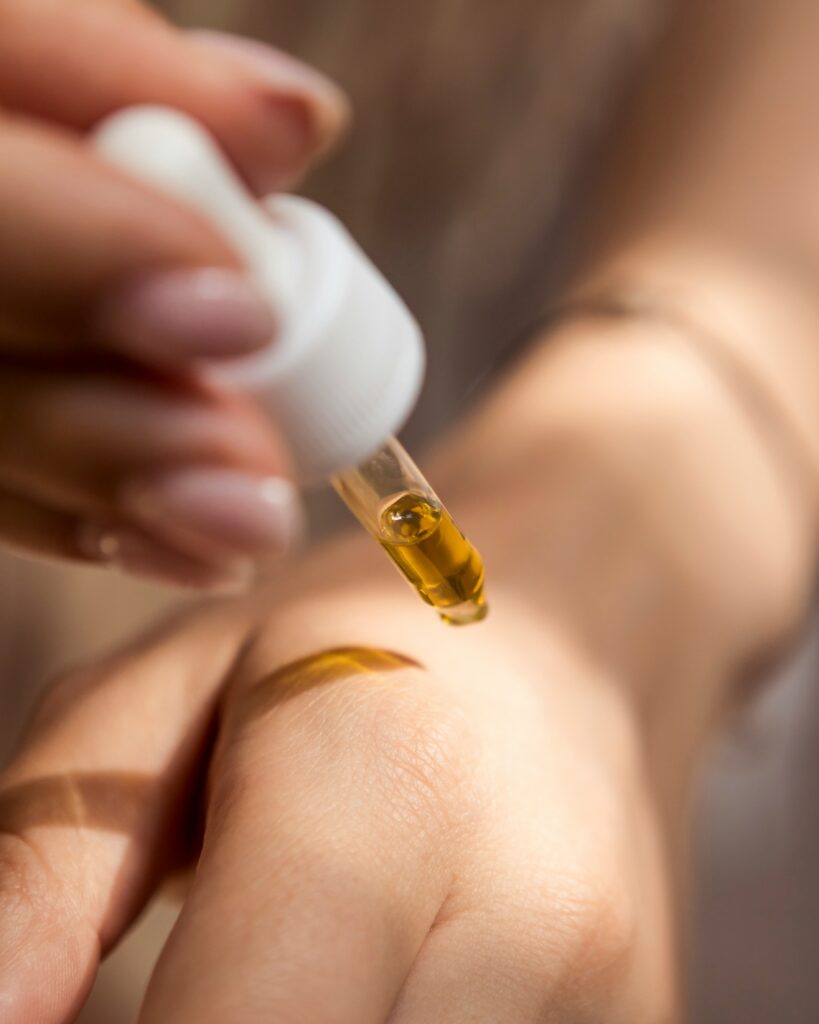The Myth of Retinol & Skin Thinning
You’ve probably wondered: “Does retinol thin skin?” It’s a concern that often makes people hesitant to incorporate retinol into their skincare routines. But is this really true, or is it a misunderstood side effect of one of the most studied and effective anti-aging ingredients?
For decades, retinol has been the gold standard in dermatology for treating wrinkles, hyperpigmentation, acne, and overall skin renewal. However, some users experience peeling, sensitivity, or dryness, which leads to the misconception that retinol weakens or thins the skin.
The truth? Retinol does not thin the skin in the way most people fear. In fact, long-term use thickens the deeper layer of the skin (dermis), making it firmer and more resilient. But to fully understand this, we need to break down how retinol interacts with skin structure and why it sometimes gets a bad reputation.
Table Of Contents
- The Myth of Retinol & Skin Thinning
- What Does “Thinning the Skin” Actually Mean?
- Retinol’s True Effect on Skin Thickness
- Why Do Some People Think Retinol Thins the Skin?
- Who Should Be Cautious with Retinol?
- How to Use Retinol Without Weakening the Skin
- Retinol vs. Bakuchiol: A Gentler Alternative?
- Conclusion: Does Retinol Really Thin Your Skin?
- Retinol – Final Verdict:
What Does “Thinning the Skin” Actually Mean?
Understanding Skin Layers: The Epidermis vs. The Dermis
To understand how retinol affects the skin, let’s first clarify what “thin skin” means. Skin thinning can refer to changes in either of its two major layers:
| Skin Layer | Function | Does Retinol Affect It? |
| Epidermis (Outer Layer) | Protects against environmental damage, prevents moisture loss, and maintains barrier integrity. | Yes, temporarily. Retinol speeds up cell turnover, exfoliating the top layer. |
| Dermis (Deeper Layer) | Houses collagen, elastin, and fibroblasts, giving skin its structure, firmness, and elasticity. | Yes, in a positive way. Retinol increases collagen production, making the dermis thicker over time. |
What Actually Causes the Skin to Thin?
There are several factors that lead to genuine skin thinning, and retinol is NOT one of them. Here’s what actually contributes to thinning skin:
- Aging: Over time, collagen and elastin naturally degrade, leading to skin that is thinner, weaker, and more fragile.
- Chronic UV Exposure: Sun damage depletes collagen, accelerates skin aging, and weakens skin structure.
- Corticosteroid Use: Prolonged steroid cream use is a known cause of skin atrophy, leading to loss of both epidermal and dermal thickness.
- Nutrient Deficiencies: A lack of vitamin C, amino acids, and essential fatty acids can slow down collagen production, weakening skin integrity.
Fun Fact: Unlike corticosteroids, which thin the skin by suppressing collagen synthesis, retinol actually increases collagen levels in the dermis, making skin thicker and more resilient.

Retinol’s True Effect on Skin Thickness
How Retinol Affects the Epidermis (Outer Skin Layer)
One reason people believe retinol thins the skin is that it speeds up cell turnover, meaning old skin cells shed faster. This process can lead to:
- Temporary peeling and flakiness
- Increased sensitivity, especially to UV rays
- A feeling of “weaker” or “fragile” skin in the first few weeks
However, this initial reaction is not true thinning. Instead, it is controlled exfoliation, which encourages newer, healthier cells to reach the surface faster. Over time, the epidermis stabilizes, and barrier function improves.
How Retinol Affects the Dermis (Deeper Skin Layer)
Unlike steroid creams or environmental damage, retinol has been clinically proven to thicken the dermis.
Scientific Study: A 12-week study found that consistent retinol use improved skin firmness and elasticity, improving fine lines and wrinkle depth (C. Piérard-Franchimont et al.).
| Study Findings | Impact on Skin |
| Increased collagen synthesis | Skin becomes firmer and more elastic |
| Thickened dermal layer | Skin appears plumper and more resilient |
| Enhanced fibroblast activity | Skin can repair itself more efficiently |
Why Do Some People Think Retinol Thins the Skin?
The Temporary Peeling & Sensitivity Phase
One of the biggest reasons for this misconception is that early retinol users experience peeling, redness, and irritation. This leads to the feeling that the skin is:
❌ Weaker ❌ More sensitive ❌ More reactive to the environment
But in reality, this is just the skin adjusting to an increased turnover rate. Within 4-6 weeks, the epidermis adapts, and the “fragile” feeling disappears.
Overusing Retinol & Barrier Damage
Yes, retinol can weaken the skin barrier—but only if misused. Applying high-strength retinol too frequently without supporting ingredients can lead to:
⚠️ Excessive exfoliation
⚠️ Barrier dysfunction (leading to dehydration and irritation)
⚠️ Compromised microbiome
Pro Tip: If your skin feels overly dry or irritated, try buffering retinol by applying a hydrating serum (like hyaluronic acid) first.
Confusing Retinol with Corticosteroids
Some people mistakenly compare retinol’s effects to topical steroids, which are known to thin the skin over time. However, retinol and steroids work in completely opposite ways:
| Topical Steroids | Retinol |
| Suppress fibroblast activity (leading to collagen loss) | Stimulates fibroblasts to increase collagen production |
| Reduces skin thickness over time | Strengthens and thickens the dermis |
| Used for inflammation control | Used for anti-aging and skin renewal |
Key Takeaway: While steroid creams thin the skin with prolonged use, retinol strengthens it—as long as it’s used correctly and consistently.

Who Should Be Cautious with Retinol?
While retinol is an excellent anti-aging and skin-renewing ingredient, it’s not universally suitable for everyone. Some individuals need to proceed with caution to avoid excessive irritation or unintended damage to their skin barrier.
If You Have Naturally Thin or Compromised Skin
Individuals with thin skin due to genetics, aging, or underlying skin conditions (such as eczema, rosacea, or perioral dermatitis) are more likely to experience irritation when using retinol. Since retinol accelerates cell turnover, already fragile skin may struggle to maintain its natural barrier function, leading to redness, dryness, and discomfort.
What happens? Retinol speeds up the exfoliation of the outer layer of skin. If your skin is already thin and delicate, this process may result in increased trans-epidermal water loss (TEWL), leaving your skin feeling more sensitive and exposed.
Solution:
- Choose lower concentrations (0.1%-0.3%).
- Apply retinol once or twice a week, gradually increasing frequency.
- Pair it with barrier-repairing ingredients like ceramides, niacinamide, and squalane.
If You Are Overusing Other Exfoliants
Layering retinol with AHAs, BHAs, or physical scrubs can lead to:
⚠️ Barrier compromise, causing irritation, redness, and sensitivity.
⚠️ Over-exfoliation-induced inflammation, potentially worsening hyperpigmentation.
⚠️ Excessive dryness, leading to a weakened skin microbiome.
Solution: Balance your routine. If you’re using exfoliating acids alongside retinol, space them out:
| Day of the Week | Morning Routine | Night Routine |
| Monday | Vitamin C, SPF | Retinol, moisturizer |
| Tuesday | Hydrating serum, SPF | AHA/BHA exfoliant, moisturizer |
| Wednesday | Vitamin C, SPF | Retinol, moisturizer |
| Thursday | Hydrating serum, SPF | AHA/BHA exfoliant, moisturizer |
| Friday-Sunday | Hydrating serums, SPF | Retinol (twice a week) |
If You’re Not Using SPF Daily

Using retinol without sunscreen is like going to the gym and eating junk food right after—it cancels out the benefits!
Since retinol increases skin renewal, it leaves fresh skin more vulnerable to UV damage.
Solution:
- Apply SPF 30+ daily, even on cloudy days.
- Reapply every 2-3 hours if you’re outdoors.
- Wear protective clothing and sunglasses for extra protection.
How to Use Retinol Without Weakening the Skin
Retinol strengthens skin when used correctly, but misuse can lead to barrier impairment. Follow these best practices for optimal results without unnecessary irritation.
The Right Way to Introduce Retinol
✅ Start low and go slow:
- Begin with a lower strength (0.1%-0.3%) to allow your skin to adjust.
- Apply 2x per week, increasing frequency as your skin builds tolerance.
✅ Nighttime use only:
- Retinol degrades in sunlight, so apply it at night for maximum effectiveness.
✅ Use a pea-sized amount:
- More product doesn’t mean better results—it just increases the chance of irritation.
Scientific Insight: A six-month clinical study showed that gradual introduction of retinol resulted in significantly lower irritation compared to immediate nightly use.
Retinol Pairings: What Works and What to Avoid
| Pair With | Benefits | Avoid With | Why? |
| Niacinamide | Strengthens skin barrier, reduces redness | Benzoyl Peroxide | Can deactivate retinol’s efficacy |
| Hyaluronic Acid | Hydrates and prevents moisture loss | High-dose Vitamin C | May cause irritation when layered |
| Ceramides & Peptides | Support barrier repair and prevent irritation | Strong AHAs/BHAs | Over-exfoliation risk |
Buffering Retinol for Extra Sensitive Skin
If your skin reacts too strongly, try buffering retinol:
Mix retinol with a moisturizer before applying it to dilute potency.
Apply a hydrating serum first (like hyaluronic acid) to create a protective base.
Follow with an occlusive moisturizer to seal in hydration.
Key Takeaway: Retinol should always be paired with hydrating and barrier-repairing ingredients to maximize benefits while minimizing irritation.
Retinol vs. Bakuchiol: A Gentler Alternative?
For those who can’t tolerate retinol, bakuchiol is often marketed as a natural alternative. But does it match up?
| Feature | Retinol | Bakuchiol |
| Source | Synthetic Vitamin A derivative | Plant-based (Psoralea corylifolia) |
| Collagen Boosting | Increases collagen density by 30%+ | Similar effects, but fewer studies |
| Irritation Potential | Can cause redness, peeling | Minimal irritation |
| Sun Sensitivity | Increases photosensitivity | Does not increase UV sensitivity |
| Pregnancy-Safe? | ❌ No | ✅ Yes (but more research needed) |
Scientific Study: A 12-week study comparing 0.5% retinol and 0.5% bakuchiol found similar anti-aging benefits, but bakuchiol users experienced fewer side effects.Verdict: If your skin can handle retinol, it remains the more potent option. But if you have sensitive skin, bakuchiol is a viable alternative (Dhaliwal et al.).
Conclusion: Does Retinol Really Thin Your Skin?
Retinol – Final Verdict:
- Best for: Those targeting wrinkles, acne, hyperpigmentation, or loss of firmness.
- Not ideal for: Extremely sensitive skin, unless buffered properly.
- Alternative: Bakuchiol for a gentler anti-aging approach.
Pro Tip: Retinol takes 8-12 weeks to show visible results—consistency is key!
Your Turn!
Have you noticed changes in your skin with retinol? Drop a comment below!
💌 Subscribe for expert skincare insights, backed by science!

